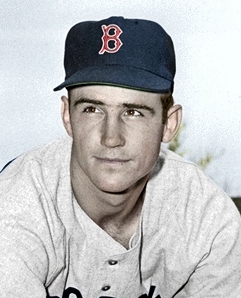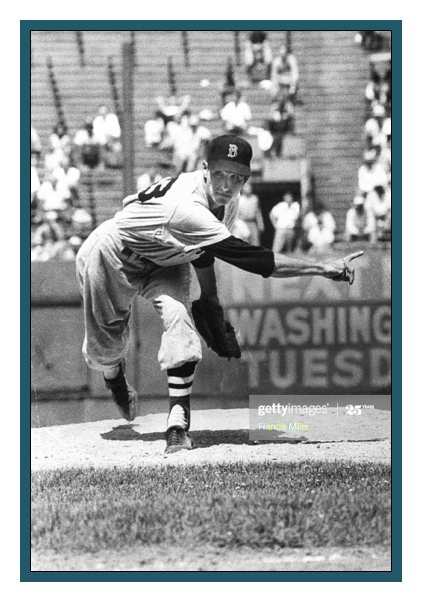|
“FENWAY'S BEST PLAYERS”  |
|||
Tom Brewer Jr. was was born in Cheraw, North Carolina on September 3, 1931. Brewer grew up in Cheraw and went to elementary and high schools there. He played in the major leagues for eight seasons (1954-61), all with the Boston Red Sox, and compiled a record of 91-82. Brewer’s family has Carolina roots going back several generations. His father, Thomas Austin Brewer Sr., was born in South Carolina and worked for the post office until he retired. The elder Brewer met and married Pauline McGee Parker, who was born in North Carolina and was a librarian. Together Tom Sr. and Pauline raised three children: Madeleine, Carol, and Thomas Jr., the youngest. Brewer played high-school baseball beginning as a seventh-grader and ended up playing six years on the Cheraw High School team. He played third base except for some games in his senior year when he pitched. In addition to being a good hitter, with a strong arm, speed was one of his assets, Brewer said. He also played on the high school football and basketball teams. Recognized as the “first professional athlete of merit from Cheraw,” Brewer had his number 13 retired by the school in November 2006. During the summer, he played American Legion and “sand hill” ball (a league for high-school-age boys made up of teams from the Carolinas). His last couple of years in high school he joined the Beaunit Mills team in Rockingham, North Carolina, part of the Mill League, an adult league that represented mills in the region. In 1950, after graduating from high school, he played in a summer league, called the Palmetto League, which scheduled games every day. Brewer played with some good players in that league, among them Harry Byrd, 1952 American League Rookie of the Year. Baseball scouts, including Mace Brown of the Boston Red Sox, took an interest in Brewer while he was in high school, but Brewer said he wanted to go to college first. Brewer attended Elon College beginning in the fall 1950 and played varsity ball during the 1951 season. While at Elon, he was converted to a pitcher; a move urged by Mace Brown, and continued to play the infield. Elon’s 1951 team won the North State Conference and Tom was selected to the all-conference team. In April 1951, with his father as a co-signer, Brewer signed with the Red Sox for a $6,000 bonus. After signing, Brewer went on to play that 1951 season with the High Point-Thomasville Hi-Toms in the North Carolina State League (Class D). Brewer not only did well on the mound but contributed at bat with a .304 batting average. The team also won the two playoff series and eight of the nine games played. Despite Brewer’s winning four of the playoff games, what he remembered for an interviewer was walking in the winning run in a 10th-inning loss. On December 3, 1951, Brewer was drafted into the Army and served until December 1953. Other than basic training in Fort Jackson, South Carolina, he spent his service time at Camp Atterbury, Indiana. He played ball there and was named to the All-Army team in 1952. Over the two years he finished with a record of 35-7. Brewer attended an early February 1954 special Red Sox school for pitchers. In spring training, he did well and at one point pitched 28 scoreless innings. Red Sox manager Lou Boudreau was impressed especially with Brewer’s change-up, which he declared “almost as good as Ellis Kinder’s.” Brewer’s first major-league game was a start against the Philadelphia A’s in Boston’s Fenway Park on April 18th. He lasted 3⅓ innings, allowing seven hits and four runs (three earned) and received the first loss of his big-league career. In his second start Brewer lost a 1-0 heartbreaker to the Chicago White Sox; he had a no-hitter until there was one out in the seventh inning. He finally picked up his first win on May 17th, against the Detroit Tigers, going seven innings and giving up three runs on eight hits. On June 7th Brewer picked up win number two and fanned 11 batters, a record at the time for Red Sox pitchers, even though it took him 12 innings to do it. Brewer finished his initial year with a record of 10-9, an earned run average of 4.65, 23 starts, and seven complete games. It was good enough to receive the club’s rookie of the year award.19 Brewer’s 1955 season got off to a slow start; he did not get his first win of the season until May 27th, his ninth start. The World Series was not to be for the fourth-place Red Sox, but Tom ended the season with a record of 11-10 and an earned run average of 4.20, modest improvements over his rookie year performance. In contrast to his slow start in 1955, Brewer had a record of 11-3 by the All-Star break in 1956. He was beginning to gather national attention, too, with a full-page article about him in the June 20 issue of The Sporting News. The outstanding first half earned Brewer selection to the All-Star held in Washington’s Griffith Stadium. Tom pitched the sixth and seventh innings and allowed three runs, one coming on a home run by Stan Musial. The American League lost, 7-3; Brewer did not figure in the decision. Brewer ended the 1956 season with his best year in the majors, going 19-9 with a 3.50 earned run average while allowing opposing hitters only a .220 average. He had four shutouts, 15 complete games, and nine games in which he held the other team to four hits or fewer. He also had a good year at the plate, hitting.298. Arm troubles late in the season kept Brewer from being a 20-game winner. He remembered that over his last six appearances of the season, his right elbow would swell up. Then, he would follow up with cortisone injections the day after, which would allow him to start again in four or five days. At 19 wins, he was slated to pitch the last game of the season, in Yankee Stadium, but the team told him that as far as they were concerned he was a 20-game pitcher and they didn’t want him to hurt himself permanently. It was a wise move. During the offseason Brewer worked on rehab of his elbow and, along with rest, the pain and swelling were cured and Tom said he never had any more trouble with his elbow. Brewer was the unanimous choice of the Boston sportswriters as the team’s most valuable pitcher. Brewer had a good start in 1957 and was being boosted for an All-Star bid again. After a win on May 22nd against the Cleveland Indians in Fenway Park, he was 6-2 in his first eight starts of the season, with a 2.18 earned-run average and two shutouts, one a two-hitter against the Senators on May 12th. He cooled down after that and was not selected for the All-Star team. However, Brewer finished the season with a positive record of 16-13, including 15 complete games for a Red Sox team that finished third with an 82-72 record. In 1958,Brewer and he had a 3-6 record by the All-Star break. He finally got going and beginning with a complete game three-hitter against the Senators in Fenway Park on August 6th, he went 6-0 over the course of seven starts. He finished with a 12-12 record and the 1958 team again ended in third place, with a record of 79-75. Brewer got off to a slow start again in 1959. He came down with the flu in April that caused him to miss a workout. In early June, Brewer suffered a hairline fracture on his pitching hand when the Baltimore Orioles’ Gus Triandos hit a ball back at him. It was the second time during the 1959 season that Brewer had been hit on his pitching hand by hard-hit balls. The injury was so severe that he was unable to grip a bat and reportedly swung with one hand during one game, even getting a single. Brewer was characterized as the team’s “hard-luck champ” as the 1959 season wore on. On August 23rd, he lost a 1-0 game when Tito Francona of the Cleveland Indians hit a game-ending home run in the ninth inning for the game’s only run. That loss was Brewer’s ninth, six of which were by one run. For the season he was 10-12 with a 3.76 ERA. The 1960 season proved to be Tom’s last full season. Brewer posted a 10-15 record with a 4.82 ERA, his worst in his major league career. The team finished in 7th place with a record of 65-89. During the 1961 season, Brewer was placed on the disabled list for the first time in his major-league career. On May 15th he started against the Cleveland Indians and lasted one pitch. Brewer had been nursing a sore shoulder since spring training and felt a sharp twinge on the pitch and that was it for the day. The Red Sox team doctor prescribed a week’s rest and Brewer did not pitch again until May 31st against the Yankees at Fenway Park. Five days later, Brewer tried again and started against the Kansas City A’s. He lasted four innings, was wild again, walking five batters, and allowed three hits and three runs, two of which were earned. He went on the disabled list on June 7th with a pulled tendon in his right shoulder. In late June, Brewer felt he could come back and help the club with 10 or 11 victories over the last part of the season. Brewer’s optimism was not enough to cure his physical problems and he got into only two more games that season, both in September. He appeared in his last major-league game on September 27, 1961, when he started in Fenway Park and threw three innings, holding the White Sox to no runs on one hit. He finished with a 3-2 record, having pitched in only 10 games and 42 innings, but with a respectable earned run average of 3.43. Being on the disabled list and taking nearly three months to rest his arm had not helped Brewer. After that game, he said, he admitted to himself, “That’s it. … I can’t do it anymore.” He was 30 years old. The Red Sox released him after the season but invited him to their 1962 spring training camp as a non-roster player. Brewer went 91-82 over the course of eight major-league seasons, all with the Red Sox. He maintained a decent career batting average for a pitcher, .207. Brewer had hopes of staying in baseball after his pitching career ended but received no serious offers. In 1962 one team called him about managing one of their minor-league teams for $5,000 that summer but that was not enough for him to take up the offer. During one offseason Tom worked as a temporary mailman and was assigned a 9.5-mile route. He thought the route would serve as a good morning workout, but it ended up becoming a slow daylong walk as people along his route would recognize him and want to talk baseball and get autographs. Most of Brewer’s post-baseball career was spent as a probation officer for the South Carolina Probation Office, from which he retired after 25 years. Barbara Brewer worked for J.P. Stevens and then for Stanley Tools, from which she retired. As one of South Carolina’s best professional athletes Brewer has been recognized at the state and local levels. In 1985 he was inducted in the South Carolina Athletic Hall of Fame. On February 15, 2018, Tom Brewer passed away in Cheraw where he had lived all of his 86 years.
|
|||

